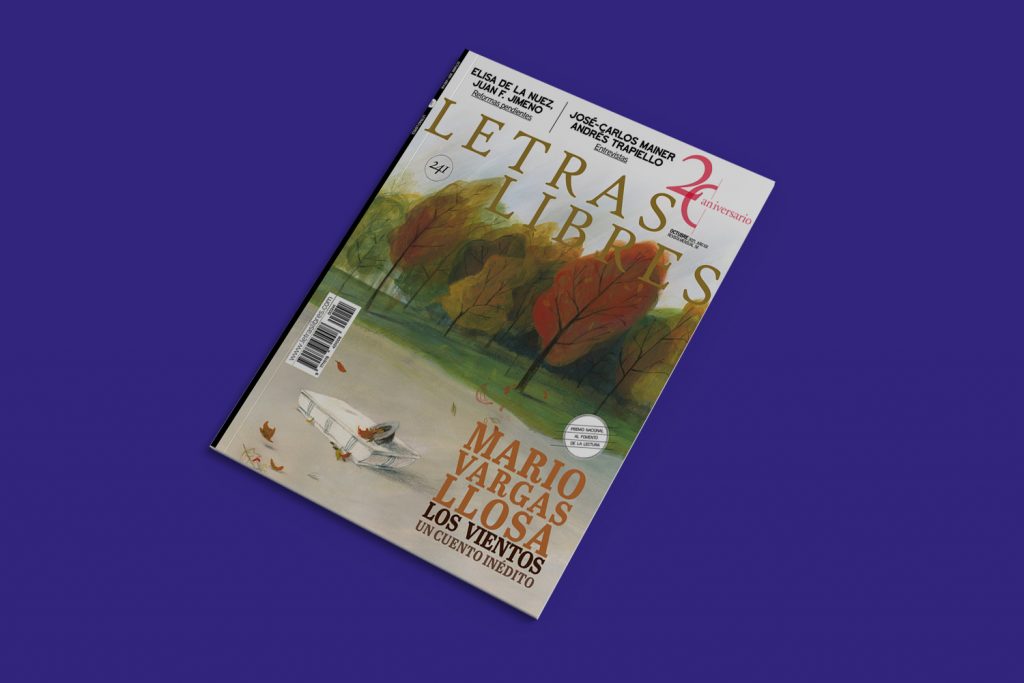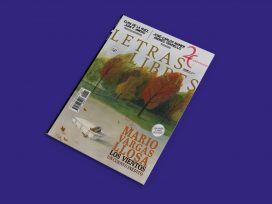In the twentieth anniversary of ‘Letras Libres’, Mario Vargas Llosa vents his spleen at modern society – or maybe he is just having an attack of wind. Also: why Spain is incapable of institutional reform.
Letras Libres marks the twentieth anniversary of its Spanish edition with a new short story by Mario Vargas Llosa, in which the 85-year-old novelist presents both an unsparing image of the consequences of ageing and a sardonic, dystopian vision of society in a not-too-distant future. The title, Los Vientos (‘The winds’), is a play on words, evoking both chilly autumn weather and embarrassing attacks of flatulence.
He attends a demonstration to protest at the closure of Madrid’s last cinema, unneeded since all images moved online, and visits one of only four surviving bookshops, unwanted since a campaign for a ‘Paper-free society’ on hygiene grounds. The old man forgets where he lives and is unable to get home. As he struggles to recognize places amid growing anxiety, tormented by remembered regrets, he observes the technologized world around him.
The general opinion is that seeing original works of art is pointless, since they can be appreciated better on a screen; theatre and opera have been replaced by ‘multimedia spectacles’ where spectators receive a flow of extra information and exchange comments on their devices, becoming ‘completely distracted from the work that in theory they went to hear and see’.
He passes a site of fighting in the Spanish Civil War and ponders that, while it’s good there will be no more such wars, ‘the current “Francoism” is of another kind: without Caudillos or extremist parties, without executions or tortures, all very scientific, based on physics and mathematics, and, above all, on the absolute domination of screens and images over reason and ideas.’
The old sinful pleasures, such as sex and eating, no longer excite people, due to an obsession with hygiene, health, and antiseptic practicality. Eating meat is a clandestine activity, due both to sanitary reasons and a ‘perverse animalism that has taken over the entire world’. The city is infested with rats, because they no longer carry diseases, and it’s illegal to kill them. As for political debate, ‘there are no longer ideologies worthy of the name either. Everything has become very practical in this life, above all in politics.’
Eventually, he remembers his address, makes his way home, cleans himself up and goes to bed ready to die, leaving the reader to decide whether this broadside against contemporary living is to be taken seriously or seen more ironically as an old man’s outbreak of wind.
Constitutional reform
Reassessing Spain’s political development over the last twenty years, Elisa de la Nuez argues that the institutional architecture established by the democratic constitution of 1978 ‘is seriously damaged and, in some areas, almost in ruins’. Crises such as the financial crash of 2008 or the COVID-19 pandemic have revealed an urgent need for institutional reforms, but the system has been incapable of providing them.
A primary cause, she argues, is the partisan practices of the major political parties, particularly the conservative Popular Party and the Socialists, who have established ‘a system of informal rules … with the aim of colonizing each and every one of our institutions and elements of public administration’.
This has been especially harmful in the judicial system. The very bodies expected to act as ‘checks and balances’ have been paralysed by partisan politicization and turned into political footballs, in a manner that is ‘profoundly illiberal’. New parties that appeared to challenge this inertia, such as Podemos or Ciudadanos, have ultimately failed to make much impression.
And so the system continues, with the major parties ‘ever more self-obsessed, polarized and distanced from reality, converted into clientelist employment machines for the purpose of perpetuating themselves in power’. Instead, what Spain needs is ‘solid institutions, that is to say: professional, neutral and responsible’.
This article is part of the 17/2021 Eurozine review. Click here to subscribe to our weekly newsletter to get updates on reviews and our latest publishing.
Published 3 November 2021
Original in English
First published by Eurozine
© Eurozine
PDF/PRINTNewsletter
Subscribe to know what’s worth thinking about.
Related Articles

The conglomerate publishing industry sets conservative parameters on what it considers will sell. Repeating a winning ‘trending’ formula is high up on its list. But blobby, multi-coloured book covers lining supermarket shelves aren’t the only result of industry homogenization – independent presses are negotiating gaps in the market, spearheading literary excellence.

Literary expressions of grief across the ages use representations of nature as soothing metaphors. But rarely does the death of non-human life merit a thanatography. Could literature that finds a non-anthropomorphic means to grieve for other sentiment beings provide our desperately needed resensitization to the natural world?








